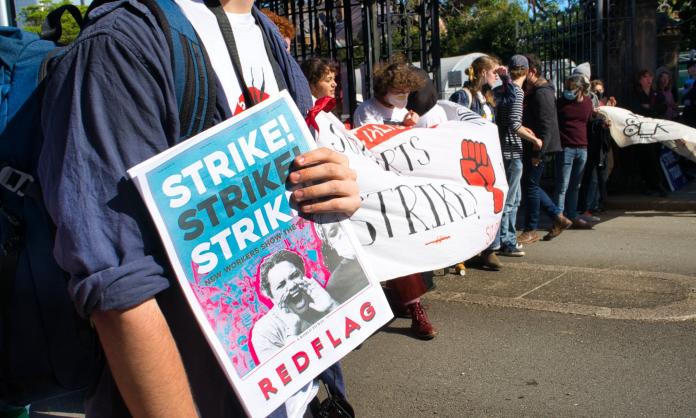Last month marked ten years since the publication of the first issue of Red Flag. At the time the paper was launched, it’s fair to say some doubts were raised about its long-term viability. Print was widely considered a dying medium—Guardian Australia had just launched in an online-only capacity with a much bigger budget and profile than Red Flag—and the audience for a socialist publication was niche, to put it politely. And as we pass the ten-year mark, AI is threatening to make the work of writers and journalists redundant.
But Red Flag has always been a publication that has gone against the grain. Its success is not measured in KPIs laid out in a business plan or by its ability to attract big-paying advertisers and celebrity journalists. Nor is its ambition the journalistic equivalent of wet lettuce—to elevate critical voices to make our democracy stronger—typical of the liberal media. Red Flag’s purpose is to be a pole of attraction for those wanting to fight capitalism and replace it with a society founded on entirely different principles, a socialist society. So its success is measured in how effectively it can be an ideological pole of attraction for those wanting to fight the system.
Against the odds, Red Flag has made important steps towards this objective in its first decade. It has a subscription base of more than 1,500, with readers drawn from all over the country. It is widely recognised as the most serious publication on the radical left. And there are hundreds of activists who read, sell, discuss and distribute it every fortnight.
Most importantly, Red Flag has consistently taken a principled political stance that is unlike any other publication. One that makes sense of the world from the perspective of workers and the oppressed and unequivocally takes a side when they fight for their rights. One that recognises the emergence of fascist and far-right forces on the streets as the threat it is and tries to arm our side with the arguments to defeat it. One that is not afraid to criticise the powerful for fear of being ostracised or marginalised. And one that seeks, not merely to inform readers, but to move them into action: to encourage and support rebellion against inequality and injustice, not just tut-tut about it.
Over the last few years, Red Flag’s coverage of the political issues raised by the pandemic is evidence of that—standing for human life and health over business as usual for bosses, defending health measures and promoting social solidarity in the face of a vicious right-wing backlash, and highlighting the need for spending on essential health services and better conditions for health workers.
Further back, our stance on key controversies such the 2015 killing of Charlie Hebdo journalists—our article about which attracted around 1 million views—the rise of the far right and the 2019-20 bushfires have all been about challenging the powers that be and forging links between workers and the oppressed in words and action on the streets.
Because our contributors are activists—involved in the campaigns that they report on and part of the movements that they document—Red Flag has frequently been able to carry reports from the front lines of struggle, despite our small budget. We have carried first-hand accounts of garment workers’ struggles in Bangladesh, teachers’ strikes in the US, political upheaval in Greece and the 2019 democratic rebellion in Hong Kong. Our coverage of strikes and industrial campaigns in Australia is often written by or in collaboration with the workers involved. And our commitment to keeping alive the history of the socialist and workers’ movement means we are keen to give a voice to those who have been a part of it, from union militants to gay liberation activists.
But all this would be for nothing if it wasn’t for the army of tireless socialist activists who every day read, sell and publicise Red Flag in their workplaces, university campuses, high schools and neighbourhoods. This commitment, rather than advertising, corporate sponsorship or paid-for distribution services, is what enables Red Flag to find a readership and a wider audience for socialist politics.
The editors would like to take this opportunity to thank all those who have contributed to the success of the paper over the last ten years—our readers, contributors, subscribers and sellers—whose combined efforts have helped make this small but important step for the socialist movement possible. With the injustice, brutality and sheer destructiveness of capitalism likely to intensify over the coming decade, winning more people to socialist politics is becoming increasingly urgent. Red Flag is committed to rebuilding the fighting socialist movement that we need, and to being both a voice and organising tool for all those who want to see a world without inequality, poverty and war.








